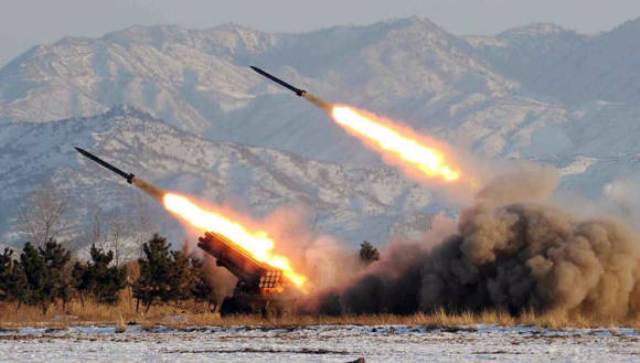
“All options for responding to future provocation must remain on the table. Diplomatic and financial levers of power will be backed up by a willingness to counteract North Korean aggression if necessary.”
Rex Tillerson, Apr 28, 2017
The theatre unfolding in various international forums regarding North Korea is garnering top prices for front seats. The press corps await the next announcement by the Trump administration on what it will do to the regime in Pyongyang. Prompt, merciless incineration? Tactical strike applied with a surgeon’s precision? All options, we are told with weekly and increasing urgency, are on the table.
The game being played by the DPRK’s Kim Jong-un is one of luring the unpredictable beast out of his lair, notably given the recent statements by US Vice President Mike Pence that the era of “strategic patience” was over.
The individual who is behaving erratically here is less the cruel plump man in a boiler suit than US President Donald Trump, who is forging a fictional time line of good conduct his North Korean counterpart has no interest in following. A good argument can be made that the ploy by the DPRK is an effort to bring stability of sorts to the international system, rendering the unpredictable more evenly predictable.
The confusion here has become a constant feature of the Trump administration, and also risks pushing the DPRK into a corner of crumbling desperation. To Reuters, Trump was playing up the delightfully dangerous prospect of war with the regime. “There is a chance that we could end up having a major, major conflict in North Korea. Absolutely.” All prime time television stuff.
On April 28, Secretary of State Rex Tillerson urged members of the UN Security Council to inflict “painful” measures on Pyongyang. “Failing to act now on the most pressing security issue in the world may bring catastrophic consequences.”
Tillerson gives the impression that existential annihilation is around the corner if nothing is done, begging the question about who is the agent behind initiating that move. Given the US record on regime change and regional destabilisation, that question is already well and truly answered, though the Chinese Foreign Minister Wang Yi was attempting to pour oil on the waters with suggestions that the crisis was no single entity’s fault. “The more we bide our time,” warned a sombre Tillerson in tones of biblical concern, “the sooner we will run out of it.”[1]
The smoke signals from the White House remain confused, a mixture of belligerence and doom, coupled with a desire to have talks about the North Korean nuclear program, with Pyongyang, if necessary. This entire orientation is proving confusing to other members of the UN Security Council trying to pin down the agenda.
To that end, Daryl Kimball, executive director of the Arms Control Association, makes an important point: “If Trump and his team insist on a North Korean commitment to ‘de-nuclearization’ before talks can begin, other members of [the] council will see the US call for ‘engagement’ as unserious and will not support new… sanctions.”[2]
Time is going nowhere, nor is Pyongyang’s surge towards security in the face of a country that refuses to reassure it. As this takes place, countries with nuclear arsenals persist in modernising, rather than eliminating them. Other theatres of potential nuclear conflict – India and Pakistan, for instance – pose potentially a graver threat with the lowering of threshold deployments by the latter.
North Korea, by way of contrast, is treated as a supreme villain with powers of global reach, however contingent these might be. It is treated, as Robert Wood, US ambassador to the UN Committee on Disarmament does, as the single greatest threat to the Nuclear Non-Proliferation Treaty, when numerous other candidates might well step up to that plate. Take, for instance, India, Pakistan and Israel, all states with nuclear arsenals, none of whom cared to join the NPT party.
The recent test failings in the ballistic missile program are treated as confirmations that the DPRK is getting closer to its aim. In the words of US Pacific Commander Admiral Harry Harris, “Just as Thomas Edison is believed to have failed 1,000 times before successfully inventing the light bulb, so, too, Kim Jong-un will keep trying.”[3] (Bullies always like boosting the fighting credentials of their victims.)
Yet again, the empire warns of dangers unseen, uncalculated, and unknown, hoping that a pretext for attack might be made out. It is the same empire that deploys, along with Russia, more than 1,500 strategic warheads capable of being delivered on bombers and missiles across the globe.
Most of all, the various ballistic missile tests are timed to aggravating perfection, raising The Donald’s hair while driving Tillerson to distraction. But the true, playground bully here remains as it has always been: the United States, self-appointed global policeman and misguided guardian.
Dr. Binoy Kampmark was a Commonwealth Scholar at Selwyn College, Cambridge. He lectures at RMIT University, Melbourne. Email: [email protected]
[1] https://www.washingtonpost.com/world/national-security/in-an-apparent-shift-tillerson-says-us-willing-to-hold-direct-talks-with-n-korea/2017/04/27/a2093a0e-2bac-11e7-b605-33413c691853_story.html
[2] https://www.washingtonpost.com/pb/world/national-security/in-an-apparent-shift-tillerson-says-us-willing-to-hold-direct-talks-with-n-korea/2017/04/27/a2093a0e-2bac-11e7-b605-33413c691853_story.html?outputType=accessibility&nid=menu_nav_accessibilityforscreenreader
[3] http://www.arkansasnews.com/news/20170426/us-ups-korean-defenses-top-admiral-says-forces-are-capable











































